Welcome to the pinnacle of property transaction efficiency! Our Property Sample Agreement document is your key to navigating the intricacies of real estate with ease. Tailored for the United…
continue reading
30+ Sample Child Care Agreements
-
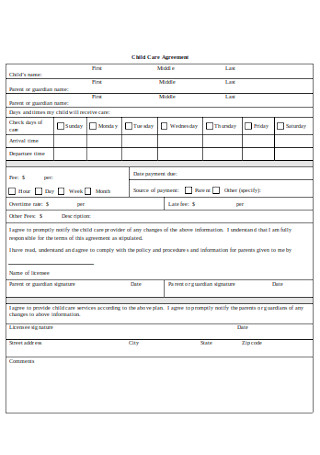
Child Care Agreement
download now -
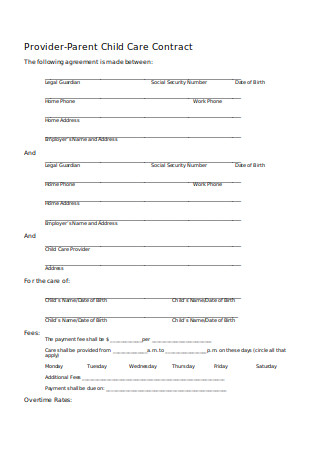
Parent Child Care Contract
download now -
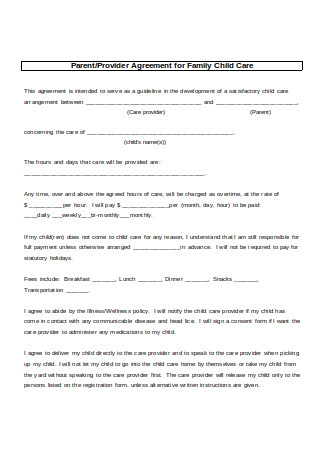
Parent Provider Agreement
download now -
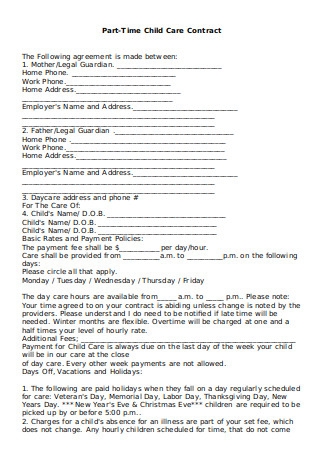
Part-Time Child Care Contract
download now -
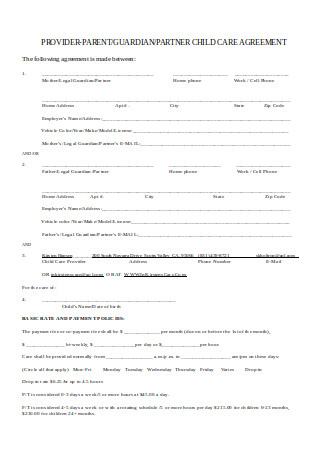
Provider-Parent Child Care Agreement
download now -
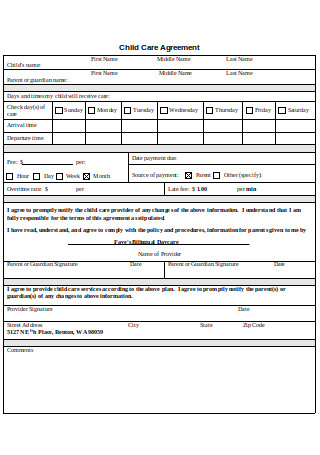
Sample Child Care Agreement
download now -
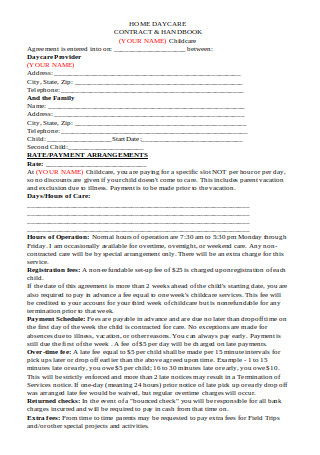
Home Daycare Contract
download now -
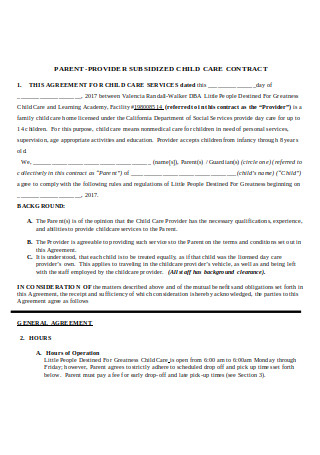
Parent-Provider Subsidized Child Care Contract
download now -
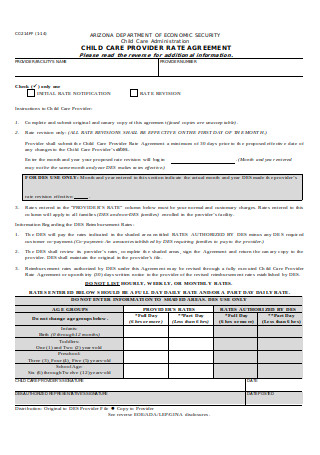
Child Care Provider Rate Agreement
download now -
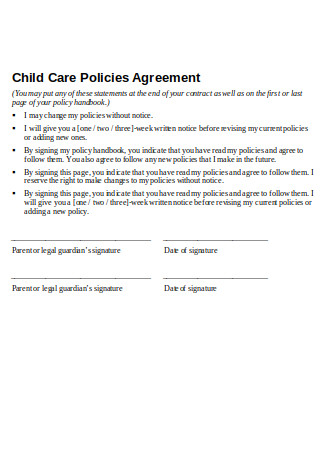
Child Care Policies Agreement
download now -
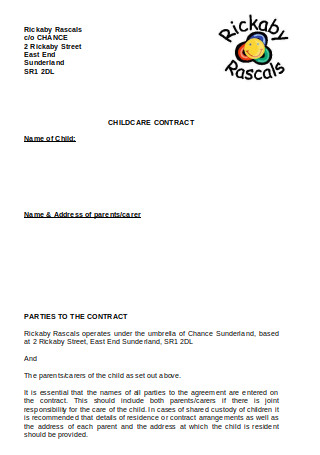
Child Care Contract
download now -
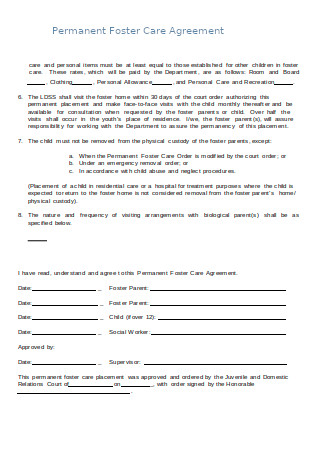
Permanent Foster Care Agreement
download now -
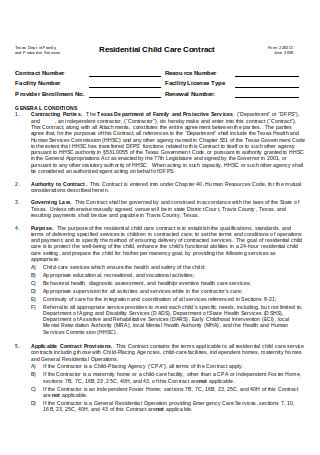
Residential Child Care Contract
download now -
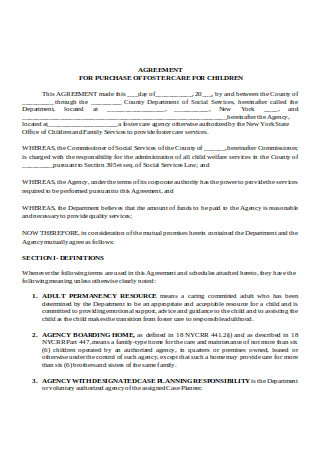
Agreement for Purchase of Foster Care for Children
download now -
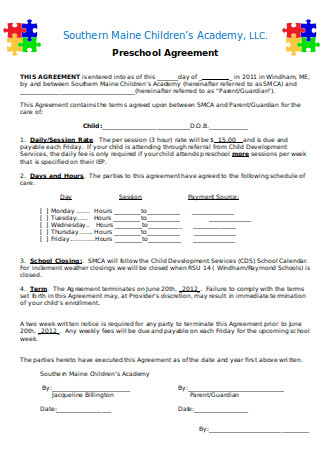
Preschool Agreement
download now -
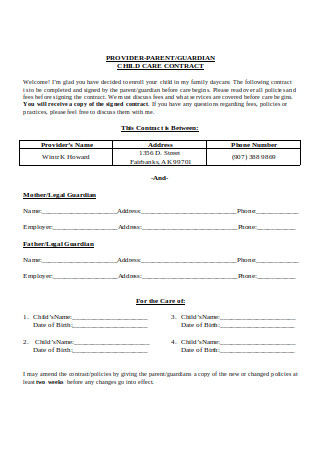
Guardian Child Care Contract
download now -
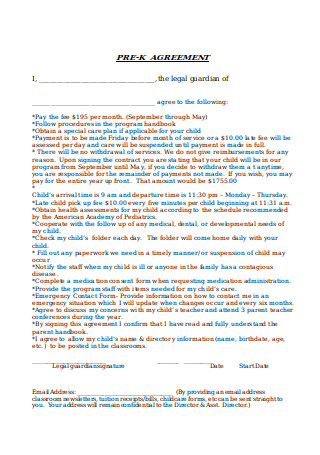
Pre-K Agreement
download now -
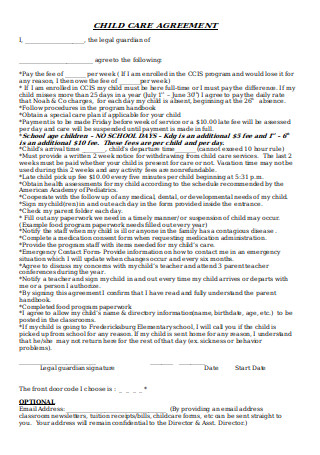
Basic Child Care Agreement
download now -
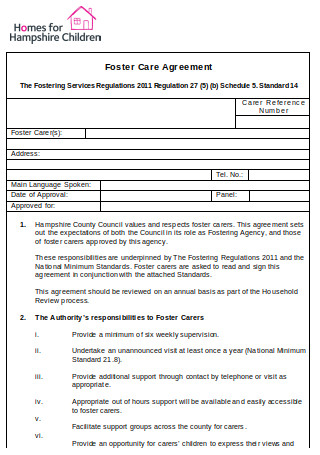
Foster Care Agreement
download now -
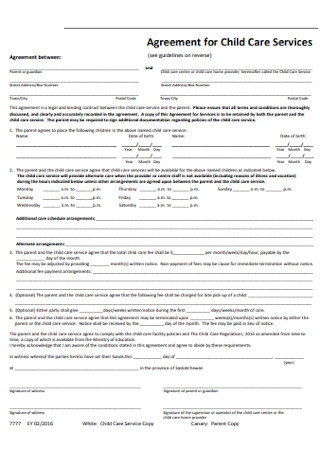
Agreement for Child Care Services
download now -
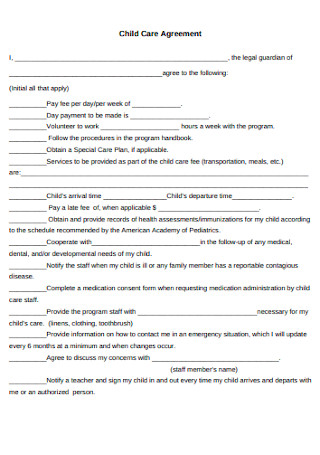
Child Care Agreement in PDF
download now -
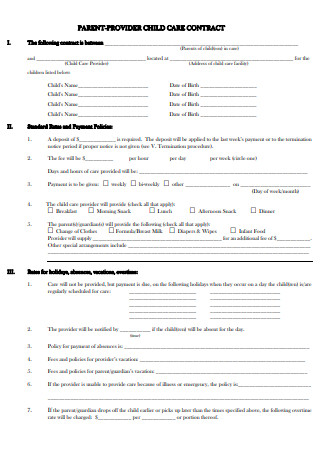
Provider-Parent Child Care Agreement Sample
download now -
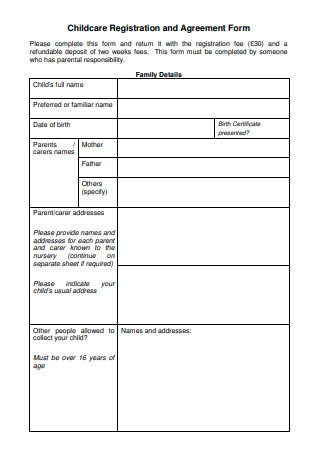
Childcare Registration and Agreement Form
download now -
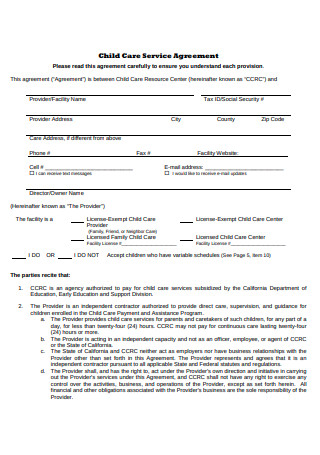
Child Care Service Agreement
download now -
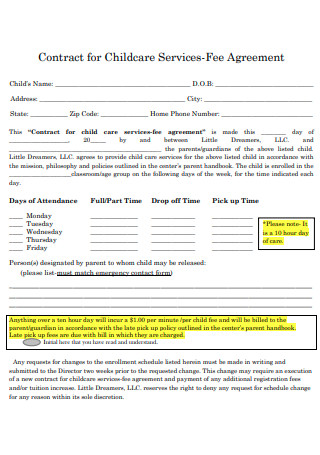
Contract for Childcare Services-Fee Agreement
download now -
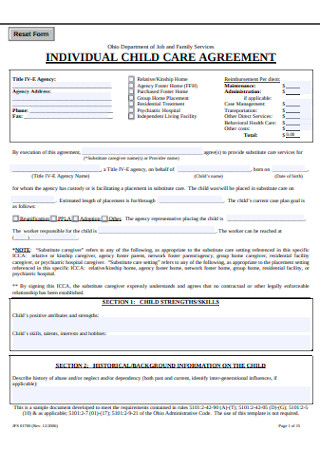
Individual Child Care Agreement
download now -
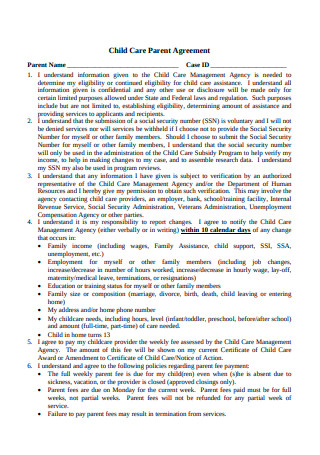
Child Care Parent Agreement
download now -
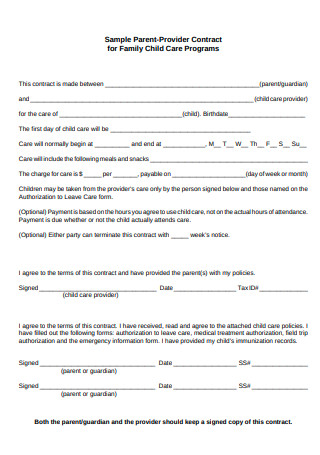
Contract for Family Child Care
download now -
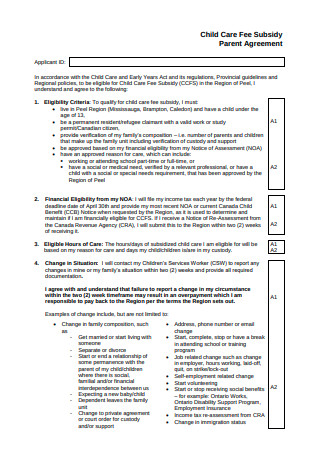
Child Care Fee Subsidy Parent Agreement
download now -
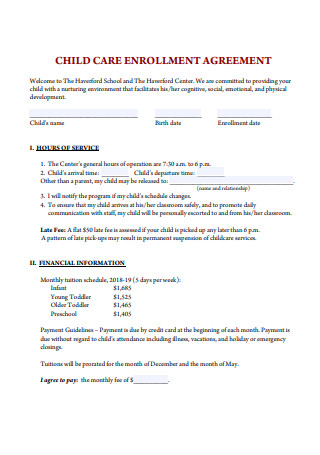
Child Care Enrollment Agreement
download now
What is a Child Care Agreement?
A parent may always want to be with his/her child, but other priorities may come in the way. For that reason, parents find help from daycare centers where the safety of their child is an assurance. According to Erin Duffin, 60.9% of children from three to five years old in the U.S. were under nonparental care in 2016. In child care centers, children have the opportunity to enhance both their mental and communication skills. In that case, parents must have a written agreement with the center where they register their child. The policies and regulations written in a child care agreement will serve as a guide for both parent and care provider. Having this written document is a good sign that the center had made careful thought of how they are going to look after a child.
Things to Look for in a Child Care Policy
According to ChildCare.gov, several policies may include a family daycare program, but there are things you should look for in a policy. Here are some of the most important ones:
How to Create a Viable Child Care Agreement
A child care agreement is a written document that specifies all the necessary information for a guardian and a child care provider to get into the business. Before beginning any work, both parties must sign a contract that lays out all the terms and conditions regarding child care. So, here are the steps in creating a viable child care agreement:
Step 1: Ask for the Necessary Background Information
The first section of your contract should ask for the names of the family members, the service provider, and the child. Next to it is a statement that expresses the responsibility of both the provider and family members to follow the conditions that will be set out in the agreement.
Step 2: Specify Hours of Work and Compensation
The care provider must agree to work on a fixed time frame. State the specific dates when a provider will begin or stop providing services to a child. In terms of compensation, state the amount a family will have to pay to a provider per hour. Also, include stipulations concerning late payments on the side of the family members. Moreover, a provider’s compensation may also be deducted in case services are not fulfilled according to the law.
Step 3: Put in Detail All Work Responsibilities
Work responsibilities may comprise of ensuring a child’s safety, attending to a child’s needs, planning activities, giving medications, preparing meals, and more. For a provider, keeping daily notes is vital so parents could keep track of the child’s daily activities. Additionally, writing down disciplinary reports will protect a provider from being wrongly accused for something he/she did not do. Proper management of work responsibilities is crucial to a business’ system.
Step 4: Write Conditions for Termination
Both the family and provider may have the right to terminate the contract as long as they desire. Also, the family may cancel the agreement without prior notice in case the provider neglects the safety of the child, fails to meet his/her work responsibilities, violates confidentiality, continues being late, uses illegal drugs, etc.
Step 5: Include Confidentiality Terms
Terms for confidentiality is key to a peaceful relationship between a family and a care provider. This provision will prevent a provider from disclosing, revealing, and using any sensitive information the family may deem confidential. In addition, this will also keep a provider from unnecessarily uploading photos or videos on social media.
Step 6: Add in the Governing Law
Conflicts and disputes may arise between the parties involved. For this reason, identifying the law that will interpret the contract is crucial. This settles which jurisdiction will have control over the terms written in the agreement.
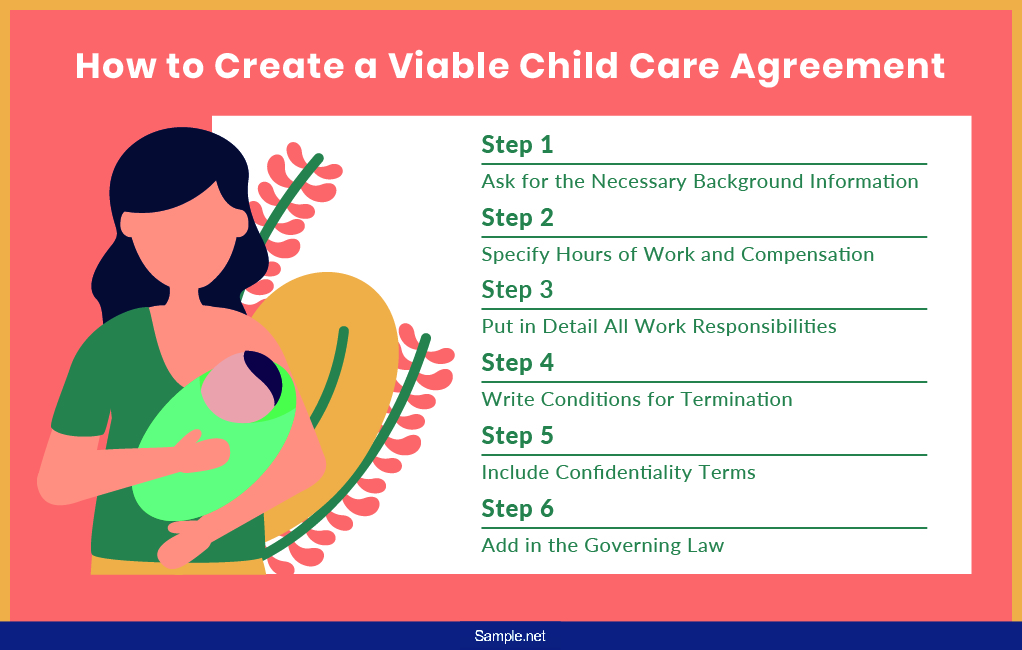
FAQs
How do I know if my child is well taken care of in daycare?
If you are not sure about your child’s condition in daycare, here are some warning signs that indicate bad daycare service: (1) They don’t have respect for your concerns. (2) Staff members always look unhappy. (3) They neglect the importance of cleanliness and safety. (4) They don’t encourage parent engagement. (5) They don’t offer documented policies.
How do kids feel when both parents are at work?
According to the American Academy of Pediatrics, children feel abandoned when both parents are at work. They suggest that parents encourage their children to talk about how work is affecting their relationship. Working parents must make some effort to let their children feel their presence. Parents can try to awaken family members a bit earlier in the morning just to have breakfast together. Also, before sleeping, parents can do some indoor activities with their children.
What are effective ways of keeping your kid healthy in daycare?
It is a fact that young ones are more defenseless against illnesses because they are exposed to viruses and bacteria they’ve never had contact before. To prevent and fight illnesses, here are some ways to keep your child healthy in daycare: (1) Boosts your child’s immune system by letting him/her eat nutritious meals. (2) Teach your child how to wash his/her hands. (3) Be aware of the daycare’s sick policy. (4) Immunize your child. (5) Prevent cross-contamination. Additionally, you can check the lists of America’s Child Care Aware to assess a facility.
Is it advisable to send a baby to daycare?
Research by Badanes et al. shows that children that are first taken care of at home up until 18 months are more likely to adjust in daycare. Meanwhile, Stanley Greenspan, a well-known U.S. researcher, suggests that parents who have ? of their time outside of work can delegate the babysitting to a home carer than a daycare center.
What is the average cost for a daycare?
According to BabyCenter, the mean cost for infant daycare starts from $5,045 to $17,082 per year. For preschoolers, the mean cost ranges from $4,439 to $12.796 per year. The prices depend on which state you are currently living in.
A child care agreement is a valuable document to those who are in the daycare business. If you own a daycare, a contract will protect your company from being wrongfully blamed for something it is not liable to. Moreover, this agreement will serve as a guiding tool for the whole operation of your institution. Not only that, it will also define your relationship with the child’s parents. It is hard enough for parents to leave their children in the care of another. Therefore, having a child care agreement with the right policies will give parents enough confidence to leave their children under your care.

